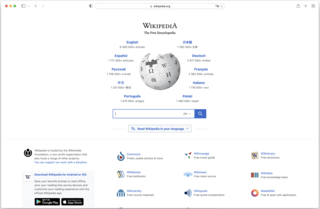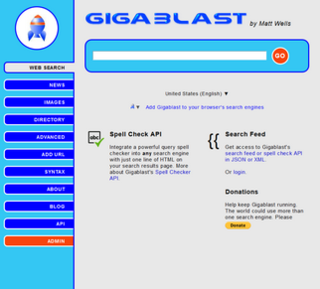Related Research Articles
Konqueror is a free and open-source web browser and file manager that provides web access and file-viewer functionality for file systems. It forms a core part of the KDE Software Compilation. Developed by volunteers, Konqueror can run on most Unix-like operating systems. The KDE community licenses and distributes Konqueror under GNU GPL-2.0-or-later.

A web browser is an application for accessing websites. When a user requests a web page from a particular website, the browser retrieves its files from a web server and then displays the page on the user's screen. Browsers are used on a range of devices, including desktops, laptops, tablets, and smartphones. In 2020, an estimated 4.9 billion people have used a browser. The most used browser is Google Chrome, with a 65% global market share on all devices, followed by Safari with 18%.

Tiki Wiki CMS Groupware or simply Tiki, originally known as TikiWiki, is a free and open source Wiki-based content management system and online office suite written primarily in PHP and distributed under the GNU Lesser General Public License (LGPL-2.1-only) license. In addition to enabling websites and portals on the internet and on intranets and extranets, Tiki contains a number of collaboration features allowing it to operate as a Geospatial Content Management System (GeoCMS) and Groupware web application.
Apache Lucene is a free and open-source search engine software library, originally written in Java by Doug Cutting. It is supported by the Apache Software Foundation and is released under the Apache Software License. Lucene is widely used as a standard foundation for non-research search applications.
In text retrieval, full-text search refers to techniques for searching a single computer-stored document or a collection in a full-text database. Full-text search is distinguished from searches based on metadata or on parts of the original texts represented in databases.
StrangeSearch is a free, open-source indexing and search engine for Windows by Jeremy Davis and Dan Dunham. It was originally developed at Iowa State University and is the inspiration of several search engines.

An open-source video game, or simply an open-source game, is a video game whose source code is open-source. They are often freely distributable and sometimes cross-platform compatible.

BASE is a multi-disciplinary search engine to scholarly internet resources, created by Bielefeld University Library in Bielefeld, Germany. It is based on free and open-source software such as Apache Solr and VuFind. It harvests OAI metadata from institutional repositories and other academic digital libraries that implement the Open Archives Initiative Protocol for Metadata Harvesting (OAI-PMH), and then normalizes and indexes the data for searching. In addition to OAI metadata, the library indexes selected web sites and local data collections, all of which can be searched via a single search interface.

MoinMoin is a wiki engine implemented in Python, initially based on the PikiPiki wiki engine. Its name is a play on the North German greeting Moin, repeated as in WikiWiki. The MoinMoin code is licensed under the GNU General Public License v2, or any later version.

DuckDuckGo (DDG) is an internet search engine that emphasizes protecting searchers' privacy and used to avoid the filter bubble of personalized search results. DuckDuckGo does not show search results from content farms. It uses various APIs of other websites to show quick results to queries and for traditional links it uses the help of its partners and its own crawler. Because of its anonymity, it is impossible to know how many people use DuckDuckGo.

The open-core model is a business model for the monetization of commercially produced open-source software. Coined by Andrew Lampitt in 2008, the open-core model primarily involves offering a "core" or feature-limited version of a software product as free and open-source software, while offering "commercial" versions or add-ons as proprietary software.
Seeks is a free and open-source project licensed under the GNU Affero General Public License version 3 (AGPL-3.0-or-later). It exists to create an alternative to the current market-leading search engines, driven by user concerns rather than corporate interests. The original manifesto was created by Emmanuel Benazera and Sylvio Drouin and published in October 2006. The project was under active development until April 2014, with both stable releases of the engine and revisions of the source code available for public use. In September 2011, Seeks won an innovation award at the Open World Forum Innovation Awards. The Seeks source code has not been updated since April 28, 2014 and no Seeks nodes have been usable since February 6, 2016.
Falkon is a free and open-source web browser developed by KDE. It is built on the QtWebEngine, which is a wrapper for the Chromium browser core.

Gigablast was an American free and open-source web search engine and directory. Founded in 2000, it was an independent engine and web crawler, developed and maintained by Matt Wells, a former Infoseek employee and New Mexico Tech graduate. During early April 2023, the website would abruptly go offline without warning, officially ending the project after 23 years.

PureOS is a Linux distribution focusing on privacy and security, using the GNOME desktop environment. It is maintained by Purism for use in the company's Librem laptop computers as well as the Librem 5 smartphone.
References
- ↑ Senousy, M.B.; Abdallah, W. K. (2011). "Investigation of free open source Search Engines". In Silhavy, Radek; Silhavy, Petr; Prokopova, Zdenka; Oplatkova, Zuzana (eds.). Computer Science and Software Techniques in 2011. Vsetín. pp. 144–168. ISBN 978-80-904741-0-9.